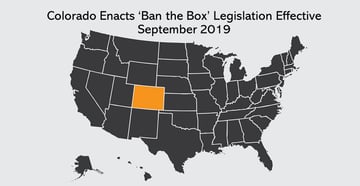
One of the biggest trends dealing with recruiting, interviewing, and hiring job candidates are the "Ban the Box" laws being adopted by multiple cities, states, and municipalities around the country. "Ban the Box" makes it illegal for employers to conduct a criminal-record check or ask an applicant if they have a criminal history before they are given an offer of conditional employment.
On August 13, 2014, the City of Baltimore joined 9 other jurisdictions in "banning the box."
Every year 650,000 Americans return to their families and society after serving out criminal sentences. For most, the hardest task they face is finding work — an essential component to both rebuilding their lives and keeping them from re-offending. But even in the most heavily incarcerated nation in the world, a prior record carries a stigma.
It is a deterrent to many employers who would otherwise hire fully-qualified job candidates. Many people with records often don’t get the consideration they deserve because they are forced to check a box that requires disclosure of a criminal background, which disqualifies them before their job applications are even reviewed. This barrier to employment now impacts one in three American adults.
When the state’s General Assembly convenes its 2020 session, members will take up hundreds of issues important to Marylanders, and among them will be a handful of holdovers from the 2019 legislative session. Gov. Larry Hogan vetoed eight bills that lawmakers put forth and passed last year, and they’re expected to weigh whether to override them in the coming weeks. One of those is, you guessed it, a "Ban the Box" bill.
HB 994/SB 839: Banning the box
This measure, which passed along partisan lines, would prohibit private employers with 15 or more full-time employees from asking an applicant about their criminal history at any time before the first in-person interview. The bill would allow an employer to ask such questions during that interview and would allow a fine of up to $300 for employers who repeatedly violate the provision.
Advocates for the bill said it would help people who’ve made mistakes in the past and who currently face tough odds re-establishing themselves in society without gainful employment.
Comments from Governor Hogan’s veto letter: “Employers have the right, and often the need, to know the criminal history of applicants they may hire. Senate Bill 839/House Bill 994 prohibits businesses from requiring an applicant to disclose this important information until the first in-person interview. This would result in costly and time-consuming human resources work that ultimately goes nowhere.”
Maryland already has a “ban-the-box” statute affecting state hiring; this bill would simply extend it to private sector employers; they would still have an opportunity to consider a criminal record and pass on an applicant, they’ll just have to consider the person first.
Will the veto stand or be overturned? Stay tuned...
If you would like to read the Ban the Box legislation, you can download the subtitle found in the City Code here:![]() Fair Criminal-Record Screening Practices.pdf
Fair Criminal-Record Screening Practices.pdf
*Parts of this post were originally published in an article by The Baltimore Sun and on the website www.marylandmatters.org.
Other posts you might be interested in
View All Posts
Colorado Enacts ‘Ban the Box’ Legislation Effective September 2019
Read More
Washington Ban-The-Box Law Limits Criminal Background Checks
Read More
